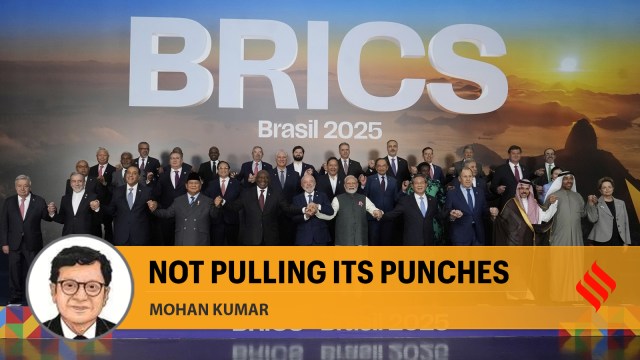
The BRICS Summit took place in Rio de Janeiro under the chairmanship of Brazil on July 6 and 7, the first after the commencement of US President Donald Trump’s second tenure. Also, this is effectively the first BRICS summit with its expanded membership, which includes Egypt, Ethiopia, Iran, Indonesia, Saudi Arabia and the UAE. The leaders’ declaration is 125 paragraphs long and covers everyrelevant and important topic.
The fact that the BRICS leaders were able to come up with a declaration based on consensus is noteworthy. The bloc now comprises members of all hues and colours, and there was some talk before the Rio meeting that its diversity would prevent the forum from taking united positions on controversial issues. The declaration reflects the strong views held by the Global South countries on a range of issues. Their leaders arguably demonstrated more unity than the G7 leaders of the West, who met recently in Alberta, Canada. The BRICS leaders produced two specific statements: One on climate finance and the other on AI governance.
Before the summit, Trump had warned BRICS countries that if they took anti-American positions (for example, proposing an alternative to the dollar) they would attract additional tariffs. In the final declaration, there is no explicit mention of replacing the dollar, but serious concern has been voiced within BRICS about the rise of unilateral tariff and non-tariff measures that distort trade and are inconsistent with World Trade Organisation (WTO) rules. While the US was not named, there are no prizes for guessing the country in question. Perhaps, to balance things out, the declaration also talks of protectionism under the guise of environmental objectives threatening international trade: A subtle but indirect reference to the EU’s proposed Carbon Border Adjustment Mechanism.
Reforming the UN finds prominence in the declaration. Perhaps for the first time, however, China and Russia stated their support for the aspirations of Brazil and India to play a greater role in the UN, including the Security Council. Their support just falls short of explicitly endorsing the candidature of both countries for the permanent membership of the Security Council . The urgent need to reform the Bretton Woods Institutions and the WTO also finds a mention, including the restoration of the two-tier system of dispute settlement. On the conflict in Ukraine, the declaration basically recalls the national positions of all BRICS members while supporting the principles of the UN Charter. There is talk of allowing diplomacy and mediation to prevail.
It is the situation in the Middle East that elicits strong language from the BRICS leaders. Is it possible that this shift is due to the newly accepted member states, namely Egypt, Iran, Saudi Arabia and the UAE? The declaration expresses grave concern about the situation in the occupied Palestinian territory, the continuous Israeli attacks against Gaza and the obstruction of the entry of humanitarian aid. Describing the Gaza Strip as an inseparable part of the occupied Palestinian territory, the BRICS leaders exhort the parties to engage in good-faith negotiations to achieve an immediate ceasefire and the full withdrawal of Israeli forces from Gaza. They go on to endorse an independent Palestinian state comprising a unified West Bank and Gaza Strip.
For India watchers, the issue in question was what kind of formulation there would be on terrorism. The leaders condemned, in the strongest terms, the terror attack in Jammu and Kashmir that took place on April 22 and reaffirmed their commitment to combatting terrorism in all its forms and manifestations. In a clear victory for India, there are references to combatting the cross-border movement of terrorists and terror financing. This should strengthen India’s case against Pakistan at the Financial Action Task Force (FATF) meetings in Paris.
It is well known that the G20 forum is under some stress because of serious bilateral differences between the US and South Africa. Indeed, US participation at the G20 summit in Johannesburg later in the year is doubtful. In the light of this, the BRICS leaders reiterated their conviction that the G20 is the premier forum for international economic cooperation, while expressing their strong support to the South African presidency.
It is clear that BRICS has not pulled any punches in its final declaration. This is despite the absence of China’s Xi Jinping and Russia’s Vladimir Putin. Of course, the leaders of Egypt, Iran, Saudi Arabia and the UAE also did not show up, choosing to send their representatives. Still, it is a remarkable declaration with a lot of plainspeak on a range of important issues.
US Secretary of State Marco Rubio stated in February this year that it’s not normal for the world to have a unipolar power. He went on to add that eventually, a multipolar world would emerge. BRICS could not agree more with Rubio.
The writer is a former Indian ambassador to France and currently dean/professor at O P Jindal Global University. Views are personal